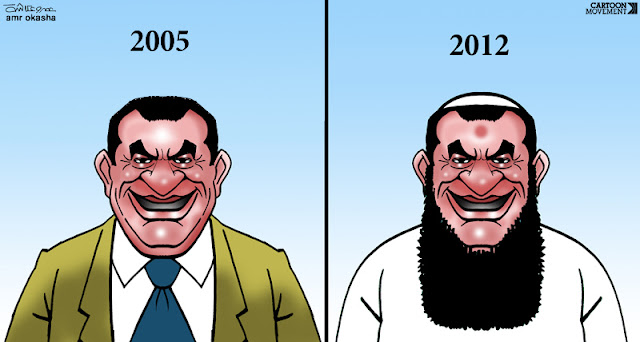Egyptian President Mohammed Morsi has warned that continuing unrest is "threatening to paralyse the country".
In a televised speech marking his first year in office, Morsi said he had made some "mistakes" since becoming president.Troops have been deployed across Egyptian cities ahead of planned weekend protests demanding his removal.
Ahead of Mr Morsi's speech, deadly clashes broke out in the northern city of Mansoura.
Two people were killed and 170 injured in fighting between supporters and opponents of the government, a health ministry spokesman told the BBC.
Morsi took power on 30 June 2012. His first year in office has been marred by constant political unrest and a sinking economy.
'Radical measures'
Anti-government protesters gathered across Cairo ahead of the president's national address
Speaking on Wednesday evening, President Morsi promised to introduce immediate and radical reforms in state institutions. He said the polarisation of politics in Egypt had reached the stage where it risked destabilising the entire nation.
Morsi added that he had done "his best to evaluate the situation" during the past year.
"I was right in some cases, and wrong in other cases," Morsi said.
"I have discovered after a year in charge that for the revolution to achieve its goals, it needs radical measures.
"Every revolution has enemies and every nation has challenges," he said, adding that he would "build on the positives and address the negatives".
-->
Morsi's year in review
- June 2012 - Narrowly wins presidential election. Orders parliament to meet in defiance of a military decree dissolving it
- July 2012 - Submits to a Supreme Court ruling that the parliamentary elections were invalid
- August 2012 - Dismisses Defence Minister Hussein Tantawi and Chief of Staff Sami Annan and strips military of say in legislation and drafting the new constitution
- November 2012 - Rescinds a decree stripping the judiciary of the right to challenge his decisions, after popular protests
- December 2012 - Public vote approves draft constitution boosting the role of Islam and restricting freedom of speech and assembly
- March 2013 - Court halts his plans to bring parliamentary elections forward to April, citing failure to refer the electoral law to the Constitutional Court
- June 2013 - Puts Islamist in charge of 13 of Egypt's 27 governorships - controversially he appoints a member of the former armed group Gamaa Islamiya to be governor of Luxor
-->
But despite Morsi's initial
conciliatory tone, the speech swiftly moved into a condemnation of named
people he blamed for Egypt's problems, the BBC's Aleem Maqbool,judges and a journalist figured among those criticised, our correspondent says.
Anti-government supporters had gathered in the capital's
Tahrir Square and outside the defence ministry ahead of Morsi's
speech.
The head of the army earlier warned it would not allow Egypt to slip into "uncontrollable conflict".
Soldiers have been stationed in areas of the capital, Cairo,
where pro-Morsi demonstrators are expected to gather following Friday
prayers.
Armoured trucks are lining the streets in near Rabaa
al-Adawiya Mosque in the city's east, which has become a gathering point
for Islamist protesters.
Troops have also been deployed to protect the presidential
palace - the scene of previous clashes - and other public buildings in
Cairo.
Fuel shortages
Tensions in Cairo have been rising ahead of the demonstrations
planned for the weekend, with counter-demonstrations by Islamists in
support of Morsi planned for the coming days.
There have also been acute shortages of fuel in the city,
leading to huge traffic jams as well as long and sometimes bad-tempered
queues at petrol stations, adding to the febrile atmosphere.
Soldiers have been deployed across Cairo and other cities around the country ahead of the protests
Some Cairenes have begun stockpiling food in anticipation of street clashes between the two opposing political camps, with staples including canned goods, grains and frozen vegetables much sought after.
Gen Abdel-Fattah al-Sisi said the army was obliged to stop Egypt plunging into a "dark tunnel", in remarks which were seen as one of the strongest interventions since the army handed over power to President Morsi last year.
Anti-Morsi activists say they have gathered 13 million signatures on a petition calling for the Islamist leader to step down. They want early presidential elections to be called to replace him.
His supporters say any move to unseat him now would be undemocratic.
Many analysts say the instability and a continuing threat of violence have frightened away foreign investors and tourists.
There is increasing unemployment, particularly among the young, and the country's foreign currency reserves are falling.
Some Cairenes have begun stockpiling food in anticipation of street clashes between the two opposing political camps, with staples including canned goods, grains and frozen vegetables much sought after.
Gen Abdel-Fattah al-Sisi said the army was obliged to stop Egypt plunging into a "dark tunnel", in remarks which were seen as one of the strongest interventions since the army handed over power to President Morsi last year.
Anti-Morsi activists say they have gathered 13 million signatures on a petition calling for the Islamist leader to step down. They want early presidential elections to be called to replace him.
His supporters say any move to unseat him now would be undemocratic.
Many analysts say the instability and a continuing threat of violence have frightened away foreign investors and tourists.
There is increasing unemployment, particularly among the young, and the country's foreign currency reserves are falling.














